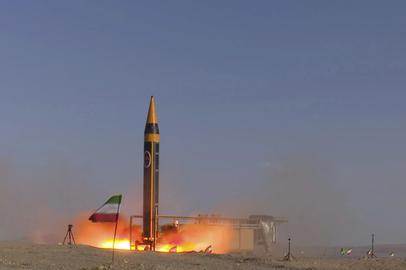In a significant move, the United States has announced a fresh round of sanctions targeting individuals and entities based in Iran, China, Hong Kong, and Venezuela, which the U.S. claims have played a role in facilitating Iran’s “destabilizing ballistic missile and unmanned aerial vehicle (UAV) programs.” The sanctions come in response to Iran’s alleged proliferation of missiles and drones, despite the expiration of United Nations’ restrictions under UN Security Council Resolution 2231 on October 18.
The U.S. Treasury Department unveiled these measures on October 18, targeting 11 individuals, eight entities, and one vessel for their alleged support of Iran’s Islamic Revolutionary Guard Corps, Ministry of Defense, and Armed Forces Logistics in the development and proliferation of missiles and drones.
Brian Nelson, the Treasury’s under secretary for terrorism and financial intelligence, condemned Iran’s actions, stating that their continued proliferation of destructive UAVs and weaponry “prolongs numerous conflicts in regions around the world.”
Of particular concern is the accusation that Iran has been supplying Russia with UAVs for use in the ongoing conflict in Ukraine, as well as providing materials for the construction of a drone manufacturing facility located east of Moscow.
These sanctions were imposed after the UN restrictions under Resolution 2231, which were part of the 2015 Iran nuclear agreement, expired on October 18. This agreement, brokered with world powers, offered Iran relief from sanctions in exchange for restrictions on its nuclear program. However, the deal was abandoned by former U.S. President Donald Trump in 2018, leading to the reinstatement of crippling sanctions on Iran. Efforts to revive the agreement have so far proven unsuccessful.
Despite the expiration of UN Security Council Resolution 2231, the United States remains resolute in its commitment to counter the perceived threat posed by Iran’s missile and UAV activities, according to a statement from the U.S. Treasury.
In parallel with these actions, Australia announced that it had reinstated targeted financial sanctions and travel bans on 19 Iranian individuals and 57 entities. These measures had previously been imposed under the UN resolution due to their role in Iran’s nuclear and missile programs. Additionally, Australia listed three individuals and 11 entities associated with those previously sanctioned under UN Resolution 2231.
Australia’s Foreign Affairs Minister, the Hon Penny Wong, emphasized the country’s intent to pressure the Iranian regime for failing to uphold its international obligations, including commitments related to nuclear activities. She stressed that Iran’s proliferation of ballistic and cruise missiles has raised tensions in an already volatile region, urging Iran to cease its escalatory actions and return to full compliance with its nuclear-related commitments.
In response to the expiration of the restrictions under Security Council Resolution 2231, the U.S. State Department issued a joint statement, endorsed by 45 countries, reaffirming their commitment to countering Iranian missile-related activities. These nations pledged to take all necessary measures to prevent the supply, sale, or transfer of ballistic missile-related items, materials, equipment, goods, and technology in the interest of maintaining peace and stability in the region.
The statement underscored that Iran’s missile program continues to pose a significant challenge to international nonproliferation efforts, highlighting the importance of addressing this issue on the global stage.





